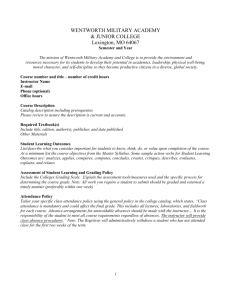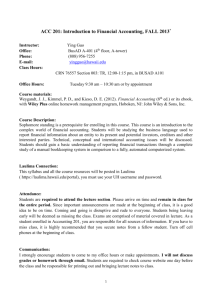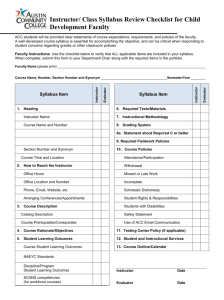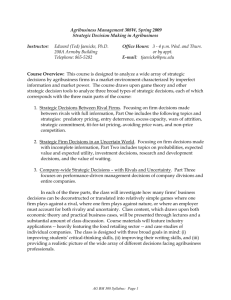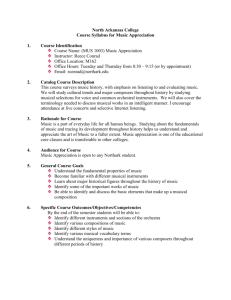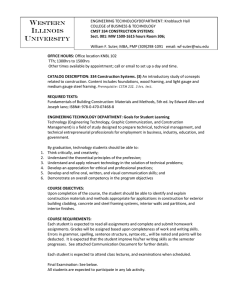ACC 660 Syllabus
advertisement
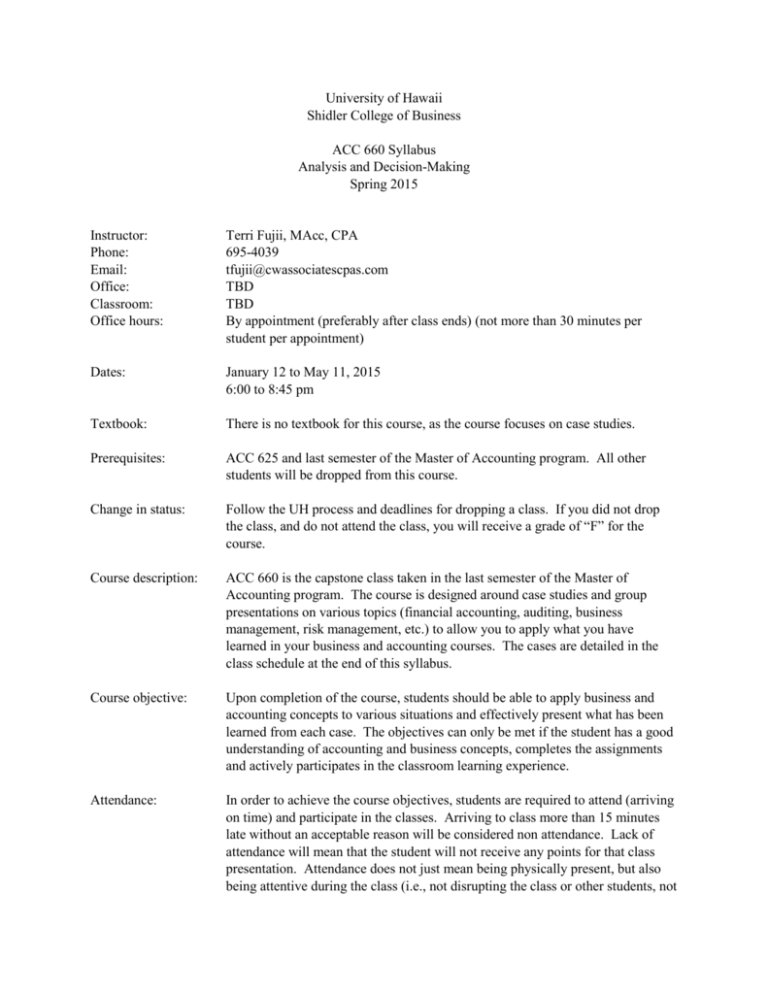
University of Hawaii Shidler College of Business ACC 660 Syllabus Analysis and Decision-Making Spring 2015 Instructor: Phone: Email: Office: Classroom: Office hours: Terri Fujii, MAcc, CPA 695-4039 tfujii@cwassociatescpas.com TBD TBD By appointment (preferably after class ends) (not more than 30 minutes per student per appointment) Dates: January 12 to May 11, 2015 6:00 to 8:45 pm Textbook: There is no textbook for this course, as the course focuses on case studies. Prerequisites: ACC 625 and last semester of the Master of Accounting program. All other students will be dropped from this course. Change in status: Follow the UH process and deadlines for dropping a class. If you did not drop the class, and do not attend the class, you will receive a grade of “F” for the course. Course description: ACC 660 is the capstone class taken in the last semester of the Master of Accounting program. The course is designed around case studies and group presentations on various topics (financial accounting, auditing, business management, risk management, etc.) to allow you to apply what you have learned in your business and accounting courses. The cases are detailed in the class schedule at the end of this syllabus. Course objective: Upon completion of the course, students should be able to apply business and accounting concepts to various situations and effectively present what has been learned from each case. The objectives can only be met if the student has a good understanding of accounting and business concepts, completes the assignments and actively participates in the classroom learning experience. Attendance: In order to achieve the course objectives, students are required to attend (arriving on time) and participate in the classes. Arriving to class more than 15 minutes late without an acceptable reason will be considered non attendance. Lack of attendance will mean that the student will not receive any points for that class presentation. Attendance does not just mean being physically present, but also being attentive during the class (i.e., not disrupting the class or other students, not sleeping, and not using electronic devices such as cellphones). Being physically present does not guarantee points for attendance. The instructor has the ability to deduct points for unprofessional behavior in the classroom. Homework: There are no specific homework assignments as there is no textbook and no exercise or problems to be completed. Homework will entail meeting with your assigned group and preparing for the following week’s presentation. Assignments: A different case will be assigned each week. The case will be briefly discussed the week prior to the presentation. Refer to the attached schedule. Students are to purchase the assigned case. The specific case assigned to each week may change depending on the availability of the professional that will be assisting in the evaluation of the group presentations. Each group is to review the case, conduct the appropriate research and prepare its presentation. The length of the presentation will depend on the number of groups and will be communicated the week prior to the presentation. Students will be assigned to a group of four to five students each week. Students are not allowed to change to a different group or to change the assigned members of each group. The students assigned to each group will change each week. Grading: Professionals will be asked to attend and participate in the evaluation of the group presentations. A total of 100 points can be earned by each student for each group presentation. The points will be made up of points awarded by fellow team members, points awarded by the attending professional, and points awarded by the instructor. The maximum points that can be awarded by fellow team members are 20 points, by the attending professional is 50 points and by the instructor is 30 points. The evaluation forms to be used will be provided and reviewed on the first day of class. Grading will not be based on a curve but based only on each student’s total points. A grade of “A” will require at least 90% of the total points, a grade of “B” will require at least 80% of the total points, a grade of “C” will require at least 70% of the total points, a grade of “D” will require at least 60% of the total points, and any points lower than 60% will be a grade of “F”. There are no make-up points for classes that are missed. Each student is responsible for keeping track of the number of points earned. Points earned as accumulated by the instructor will be provided mid-semester and on the last day of class to verify against the student’s records. Student conduct: Students are expected to behave in a professional manner as would be expected by any employer. Inappropriate behaviors for which points will be deducted include disruptive behavior (use of cell phones during class, as an example), inattentiveness, disrespecting fellow students, and begging for points. Academic Honesty: Students are expected to behave with integrity in all academic endeavors. Cheating, plagiarism, as well as any other form of academic dishonesty, will not be tolerated. All incidents will be handled in accordance with the UH Student Code of Conduct. The UH Student Code of Conduct, is available at: http://www.studentaffairs.manoa.hawaii.edu/policies/conduct_code/. Please become very familiar with the University Student Conduct Code so you can make conscience and informed choices about your behavior. Some relevant portions of the code are included below for your convenience. Acts of dishonesty, types of behavior that conflict with the community standards that the UH values and expects of students, include but are not limited to the following: a. cheating, plagiarism, and other forms of academic dishonesty, b. furnishing false information to any UH official, faculty member, or office, c. forgery, alteration, or misuse of any UH document, record, or form of identification. The term "cheating" includes, but is not limited to: (1) use of any unauthorized assistance in taking quizzes, tests, or examinations; (2) use of sources beyond those authorized by the instructor in writing papers, preparing reports, solving problems, or carrying out other assignments; (3) the acquisition, without permission, of tests or other academic material belonging to a member of the UH faculty, staff or student (4) engaging in any behavior specifically prohibited by a faculty member in the course syllabus or class discussion. The term "plagiarism" includes, but is not limited to, the use, by paraphrase or direct quotation, of the published or unpublished work of another person without full and clear acknowledgement. It also includes the unacknowledged use of materials prepared by another person or agency engaged in the selling of term papers or other academic materials. In addition to the above, the instructor specifically prohibits the following behaviors, and includes them within the definition of academic dishonesty: (1) providing another student with any form of direct or indirect, unauthorized assistance on any assignment, quiz, test or exam; and (2) copying, or recording in any manner, test or exam questions or answers. Please NOTE: UH disciplinary proceedings may be instituted against a student charged with conduct that potentially violates both the criminal law and this Student Conduct Code (that is, if both possible violations result from the same factual situation) without regard to the pendency of civil or criminal litigation in court or criminal arrest and prosecution. If a student is caught committing an act of Academic Dishonesty, as defined in the University Student Conduct Code, they will receive a grade of “F” for the course and be referred for disciplinary action as provided for by the University Student Conduct Code. Disclosures: This syllabus is a general plan and provides general guidance. It is not all encompassing and is subject to change. Changes may be made based on the availability of the professional. Location: In the event of the need to evacuate the classroom, students are to meet curbside along University Avenue near the parking lot. Supplies: Each student is to bring his/her own supplies to the class including writing instruments, paper, textbook, etc. including a basic calculator (i.e., not one on an iPhone). The instructor will not have any supplies available. Disability access” Students with disabilities are encouraged to contact the KOKUA Program for information and services. Confidentiality is maintained and there is no charge for the services. Contact KOKUA at 956-7511 or kokua@hawaii.edu. ACC 660 Case Study Assignments The cases can be obtained at: https://cb.hbsp.harvard.edu/cbmp/access/32248459 Date Topic Case 1/12/2015 Introductions and class review NA 1/19/2015 HOLIDAY NA 1/26/2015 Creating a financial statement Mama J's Marmalade 2/2/2015 Mobility 2/9/2015 Pensions Illinois Pension System 2/16/2015 HOLIDAY NA 2/23/2015 Due diligence Body Benefits 3/2/2015 Audit a section of financial statement 3/9/2015 Evaluating internal control The SOX Compliance Journey at Trinity Industries 3/16/2015 Fraud Alleged Accounting Fraud at Nortel Networks 3/23/2015 SPRING BREAK NA 3/30/2015 Governance Strategy and Governance at Yahoo! Inc. 4/6/2015 Risk management Risk Management at Lehman Brothers 2007-2008 4/13/2015 Revenue recognition Microsoft's Financial Reporting Strategy 4/20/2015 Nonprofit accounting Granville Symphony Orchestra 4/27/2015 Industry accounting issues Students pick an industry 5/4/2015 Deferred taxes Ford Motor Company: Accounting for Deferred Taxes 5/11/2015 TBD

